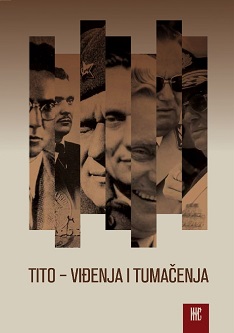Author(s): Latinka Perović / Language(s): Serbian
Publication Year: 0
The insight into the life of Dobrica Ćosić uncovers a personality that, although in formative years at first in contact with the religious movement of Bishop Velimirović, soon came under influence of communism siding with it, above all out of belief in the possibility of a more just society. With that aim he fought at war, but according to his own testimony, soon became disappointed. In 1951 he left professional Party work and turned to writing, remaining an important link between intellectuals and politics. The work and influence of Ćosić show that he wasn't just another contemporary of Josip Broz Tito, but rather more than that. The research of the relation of Dobrica Ćosić to Tito, to national and social question and to Yugoslavia has several starting points: firstly, Ćosić's relation to communism as a new religion; secondly, the writer's need to „change the world"; thirdly, the novel Roots (1954] as the turning point in Ćosić's opus; fourthly, his positioning in the discussion about leaving the Soviet party model, and in connection with that, the understanding of Yugoslavia in early 1960s; finally, the novel The Time of Death which established Ćosić in the position that would secure him the status of „the Father of the Nation" a decade later. That status is no empty metaphor, and Ćosić himself saw himself as „the paradigm of Serbian fate". On the one hand - there were numerous editions of his works, adaptations for film and theater, imposition of it as mandatory school literature, literary awards, on the other - membership in the Central Comittee of the Union of Communists of Serbia and, later on, the post of the president of the Federal Republic of Yugoslavia. With that dual role, with great self-awarenes of that role, Ćosić became a kind of institution, a collective project of a sort, around whome a network of social, political and intellectual ties came to being. From that vantage point, he acted for decades as one of the key actors in politics and culture. The polemics with the Slovenian intellectual Dušan Pirjavec in 1961/62, his positioning concerning the fate of Aleksandar Ranković, his views on national question and the overall Yugoslav ideology of the Yugoslav communists kept pushing Ćosić away from the Party which he realy left in 1971. By that time he had already become the chairman of the Serbian Book Cooperative and a corresponding member of the Serbian Academy of Sciences and Arts. In the meantime in 1969 a book by Ćosić (Power and Anxiety) was banned for the first time. During the 1980s Ćosić became the leading figure of the out-of-institutions opposition and his reputation would constantly be on the rise from then on, leading him finally to the post of the president of the Federal Republic of Yugoslavia in the midst of the war in 1992. With distancing from the national policy of the Party Ćosić increasingly embraced the idea of solving the Serbian national question through a unification of the Serbs in one state. Transplanting a 19th century goal - the Serbian state - to the end of the 2 0 th century determined everything else. The priorities: mobilizing the people and their firm unity before the domestic and foreign opponent of the goal. Means: wars for state borders. Several phases of Dobrica Ćosić's relation to Tito should be distinguished. For start, it would be important to establish chronological borderlines and internal characteristics of each period. Conditionally speaking, the periods could be named thus: 1) Fasciantion by Tito (1945-1961); 2) Struggle for Tito (1961- 1966); 3) Refusal to be Defeated (1968-1980); 4) Ideological War agains Titoism as Anti-Srbism (1980-1991); 5) Armed War for Solving the Serbian Question as a State Question (1992-1999); 6) Anti-Titoism as the Basis of the New Serbian Identity (1999-2000). Each of these periods views Tito in a different way, having in mind above all Ćosić's views on the national question to which he increasingly reduced his views on Yugoslavia and socialism.
More...

